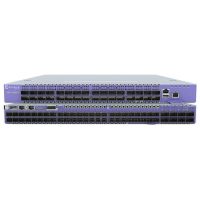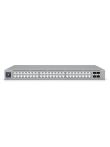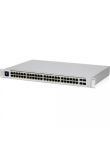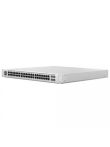Transceiver Modules
- USD 88,978.74Extreme Networks 8820-40C-AC-F 8820-40C 40x100GE/40GE QSFP28...
 In Stock
In StockBrand: Extreme Networks SKU: 8820-40C-AC-F Condition: NEW USD 88978.74 - USD 28,148.11AXIOM QDD-400G-ZRP-AR-AX 400GBASE-ZR+ QSFP-DD for Arista
 In Stock
In StockBrand: Axiom SKU: QDD-400G-ZRP-AR-AX Condition: NEW USD 28148.11 - USD 28,148.11AXIOM QDD-400G-ZRP-NO-AX 400GBASE-ZR+ QSFP-DD for Nokia
 In Stock
In StockBrand: Axiom SKU: QDD-400G-ZRP-NO-AX Condition: NEW USD 28148.11 - USD 25,393.99AXIOM QDD-400G-ZR-JNP-AX 400GBASE-ZR QSFP-DD for Juniper
 In Stock
In StockBrand: Axiom SKU: QDD-400G-ZR-JNP-AX Condition: NEW USD 25393.99 - USD 23,926.17AXIOM QDD-400G-ZR-AR-AX 400GBASE-ZR QSFP-DD for Arista
 In Stock
In StockBrand: Axiom SKU: QDD-400G-ZR-AR-AX Condition: NEW USD 23926.17 - USD 23,170.87Extreme Network VSP7400-48Y-8C-AC-F VSP 7400 48 x 10/25Gbps ...
 In Stock
In StockBrand: Extreme Networks SKU: VSP7400-48Y-8C-AC-F Condition: NEW USD 23170.87 - USD 16,867.71AXIOM QDD-400GB-LR4-AX 400GBASE-LR4 QSFP-DD for MSA
 In Stock
In StockBrand: Axiom SKU: QDD-400GB-LR4-AX Condition: NEW USD 16867.71 - USD 14,233.86Extreme Networks 5720-48MW 5720 Switch 48x MultiGig PoE 2x S...
 In Stock
In StockBrand: Extreme Networks SKU: 5720-48MW Condition: NEW USD 14233.86 - USD 13,401.21ENET QSFP-100G-ZR4-ENC 100GBASE-ZR4 QSFP28 Transceiver, Aris...
 In Stock
In StockBrand: ENET SKU: QSFP-100G-ZR4-ENC Condition: NEW USD 13401.21
Understanding Transceiver Modules in USA | Kijero
In any networking infrastructure, the role of the transceiver module is critical. They are bridges between networking devices and communication channels. Modules combine the role of both receiver and transmitter within the same circuitry. Having said that, these modules are available in various types such as optical transceivers and ethernet transceivers. Each category comprises subcategories, making it complicated for network administrators to choose the best option.
That's why, we will discuss types of optical and ethernet transceivers so that you can better select a device in line with your particular needs. Ready to dive in?
Let’s get started with optical transceiver modules.
What are Optical Transceiver Modules:
Like it has earlier mentioned transceivers combine the roles of receivers and transmitters. Therefore, optical transceivers or optical fiber transceivers are those modules that are used in fiber optics-based telecommunication and networking.
They are capable of converting electrical signals into light/optical signals so that they can travel on the fibers. Since they are capable of supporting high data transfer, optical transceiver modules are used in data centers, educational institutions, and business settings.
Types of Optical Transceiver Modules:
Depending upon form factor and data-transferring speed, these modules are classified into different categories. They have normally the following types:
- SFP
- SFP+
- SFP28
- XFP
- QSFP
- QSFP28
- CFP
Let’s discuss each type in detail:
- SFP or Small Form Factor Pluggable:
SFP is the most common type of optical transceiver. They have a smaller form factor, making them suitable for various applications. SFP transceivers are pluggable and hot-swappable, making them suitable for removing and plugging without any need to power down the devices.
SFPs can support up to 5Gbps speed, and they are compatible with multi-mode, single-mode fibers and ethernet wiring.
- SFP+:
They are essentially SFPs but feature more advanced capabilities and higher data speed. SFP+ has the same form factor as SFP but they can support up to 10 Gbps. Normally, ordinary network connections don’t have much speed, but SFP+ is more suitable for high-performing networks.
- XFP:
These are legacy transceivers, but many network administrators use them because XFPs can support up to 10Gbps speed and they are more energy-efficient. Furthermore, they are more suitable for fiber communication and they are capable of supporting high-density multiplexing.
- SFP28:
SFP28 are updated version of SFP+, offering as high as 28Gbps speed. This makes them suitable for bandwidth-intensive applications such as data centers and the like.
- QSFP (Quad Small Form-Factor Pluggable):
These optical transceiver modules can support 4 channels at a time, making them suitable for high-density and bandwidth-intensive networking. QSFP is capable of supporting much higher data than SFP or its variants.
Other variants of QSFP are as follows:
- QSFP+ is capable of supporting up to 40Gbps speed.
- QSFP28 is an even more advanced version, supporting up to a whooping 100Gbps speed.
CFP or C Form Factor Pluggable:
These modules have a larger form factor than SFP, but they are designed for a high-speed data transfer rate. They are capable of supporting up to 100Gbps speed which makes them suitable for data center interconnections and high-density telecommunication.
Now, we discuss copper transceivers.
What are Ethernet Transceivers?
Like optical transceiver modules, ethernet modules also connect devices and transmit and receive data. Known also as Media Access Units or MAU, they have a critical role in ISO network models such as the conversion of digital signals and detection of a collision. They convert electrical signals into ethernet signals so that they can travel cables such as Cat5, Cat5e, Cat6, or Cat7 cables.
Types of Copper/Ethernet Transceiver Modules:
Like optical modules, copper transceivers can be classified based on the form factor and data speed they support.
RJ45 Transceivers:
Known also as Copper SFP, RJ45 transceivers are the most common copper modules. They are designed in a way to work with Twisted Pair cables and are capable of supporting up to 10Gbps speed.
RJ45 modules have also multiple variants, such as:
- 10G SFP+ RJ45 Copper Transceiver
SFP, SFP+, and QSFP:
Similar to optical transceivers, copper modules also come in the following form factor having the same speed and specs that we have discussed above:
Small Form Factor Pluggable or SFP
- SFP+
- QSFP
DAC or Direct Attach Copper:
They are networking cables that come with integrated transceiver modules. DAC cables are usually deployed as cost-effective and high-bandwidth solutions for establishing short-distance communication. They are used in high-speed data centers and high-performing networking environments.
10GBASE-T Modules:
These modules are part of standard 10GBASE-T and implemented for supporting 10Gigabit ethernet connectivity over twisted pair cables.
They are normally used in high-speed Ethernet networking where existing cabling infrastructure can be utilized.
Wrapping Up:
Transceiver modules are key to establishing any networking infrastructure. No matter whether you are installing fiber optics-based networking or ethernet-based communication through Cat5, Cat5e, or Cat6-like cables, these modules are critical. Both optical and copper modules are available in various form factors, supporting unique speeds such as SFP, SFP+, QSFP, etc. You need to choose the type depending on compatibility, data rate, distance, and power consumption.
How Can We Help You?
Kijero is a leading value-added reseller in the USA and beyond. We deal in wide-ranging transceiver modules such as optical, copper, and the like, in addition to other networking equipment, power supplies, and networking cables. Our product experts and solution designers are working day in and day out to help our worthy customers find the best ICT hardware and solutions at the most competitive price in the market
Contact us today and enjoy high-performing networking with our cutting-edge transceiver modules of top-ranking brands such as Ubiquiti, TP-Link, and more.






